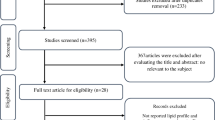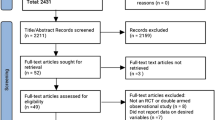Abstract
Aims
Thiazolidinediones administration is assumed to be related with an improvement of endothelial dysfunction (ED); nevertheless, previous studies have been inconsistent. For this reason, the present meta-analysis was directed to estimate if thiazolidinediones were related to endothelial dysfunction improvement by using flow-mediated dilation (FMD) measurement.
Methods
Literature search of the PubMed, the Cochrane Library, the Web of Science, and the Scopus databases was performed covering the period until July 01, 2015, for randomized clinical trials that investigated an influence of thiazolidinediones on FMD. For the calculation of the pooled overall effect, a random effect model was used. Meta-regression and subgroup analyses were performed to evaluate the impact of study characteristics on the effect of thiazolidinediones administration on FMD.
Results
This meta-analysis included 16 studies with 812 subjects. The obtained results demonstrated an improvement of endothelial dysfunction measured with FMD (16 studies, 812 subjects; WMD: 2.4 %, 95 % CI = 1.1 to 3.69 %; p = 0.0003). The significant heterogeneity was noted (I 2 = 95 %, p < 0.00001). Subgroup analysis demonstrated that pioglitazone and rosiglitazone were able to improve FMD. Also, thiazolidinediones improved FMD if treatment was longer than 12 weeks and if patients were younger than 65 years. Additionally, a lipid profile was found to influence thiazolidinediones effect on FMD.
Conclusion
The results of this meta-analysis demonstrated that thiazolidinediones were able to improve FMD, which in clinical terms can be further translated to the improvement of an impaired endothelial function. Nevertheless, the link between FMD and its predictive clinical relevance still requires further clarification.




Similar content being viewed by others
References
Radenković M (2014) Pioglitazone and endothelial dysfunction: pleiotropic effects and possible therapeutic implications. Sci Pharm 82:709–721
Diamant M, Heine RJ (2003) Thiazolidinediones in type 2 diabetes mellitus: current clinical evidence. Drugs 63:1373–1405
Radenković M, Stojanović M, Potpara T, Prostran M (2013) Therapeutic approach in the improvement of endothelial dysfunction: the current state of the art. Biomed Res Int 2013:252158
Stojanović M, Radenković M (2015) Vitamin D versus placebo in improvement of endothelial dysfunction: a meta-analysis of randomized clinical trials. Cardiovasc Ther 33:145–154
Vlachopoulos C, Xaplanteris P, Aboyans V, Brodmann M, Cífková R, Cosentino F, et al. (2015) The role of vascular biomarkers for primary and secondary prevention. Atherosclerosis 241:507–532
Rizza S, Cardellini M, Porzio O, Pecchioli C, Savo A, Cardolini I, et al. (2011) Pioglitazone improves endothelial and adipose tissue dysfunction in pre-diabetic CAD subjects. Atherosclerosis 215:180–183
Tsuchiya K, Akaza I, Yoshimoto T, Hirata Y (2009) Pioglitazone improves endothelial function with increased adiponectin and high-density lipoprotein cholesterol levels in type 2 diabetes. Endocr J 56:691–698
Asnani S, Kunhiraman B, Jawa A, Akers D, Lumpkin D, Fonseca V (2006) Pioglitazone restores endothelial function in patients with type 2 diabetes treated with insulin. Metab Syndr Relat Disord 4:179–184
Hong SJ, Choi SC, Cho JY, Joo HJ, Park JH, Yu CW, et al. (2015) Pioglitazone increases circulating microRNA-24 with decrease in coronary neointimal hyperplasia in type 2 diabetic patients- optical coherence tomography analysis. Circ J 79:880–888
Rudofsky Jr G, Reismann P, Grafe IA, Konrade I, Djuric Z, Tafel J, et al. (2007) Improved vascular function upon pioglitazone treatment in type 2 diabetes is not associated with changes in mononuclear NF-kappaB binding activity. Horm Metab Res 39:665–671
Naka KK, Kalantaridou SN, Kravariti M, Bechlioulis A, Kazakos N, Calis KA (2011a) Effect of the insulin sensitizers metformin and pioglitazone on endothelial function in young women with polycystic ovary syndrome: a prospective randomized study. Fertil Steril 95:203–209
Lee JW, Hong SJ, Jeong HS, Joo HJ, Park JH, Ahn CM, et al. (2013) Effects of a PPAR-γ (peroxisome proliferator-activated receptor-gamma) activator on flow-mediated brachial artery dilation and circulating level of microRNA-21 in hypertensive type 2 diabetic patients. J Korean Soc Hypertens 19:99–111
Naka KK, Papathanassiou K, Bechlioulis A, Pappas K, Kazakos N, Kanioglou C (2011b) Rosiglitazone improves endothelial function in patients with type 2 diabetes treated with insulin. Diab Vasc Dis Res 8:195–201
Walcher T, Walcher D, Hetzel J, Mielke C, Rau M, Rittig K, et al. (2010) Rapid effect of single-dose rosiglitazone treatment on endothelial function in healthy men with normal glucose tolerance: data from a randomised, placebo-controlled, double-blind study. Diab Vasc Dis Res 7:178–185
Wang TD, Chen WJ, Cheng WC, Lin JW, Chen MF, Lee YT (2006) Relation of improvement in endothelium-dependent flow-mediated vasodilation after rosiglitazone to changes in asymmetric dimethylarginine, endothelin-1, and C-reactive protein in nondiabetic patients with the metabolic syndrome. Am J Cardiol 98:1057–1062
Esposito K, Ciotola M, Carleo D, Schisano B, Saccomanno F, Sasso FC, et al. (2006) Effect of rosiglitazone on endothelial function and inflammatory markers in patients with the metabolic syndrome. Diabetes Care 29:1071–1076
Desch S, Sonnabend M, Niebauer J, Sixt S, Sareban M, Eitel I, et al. (2010) Effects of physical exercise versus rosiglitazone on endothelial function in coronary artery disease patients with prediabetes. Diabetes Obes Metab 12:825–828
Sidhu JS, Cowan D, Kaski JC (2004) Effects of rosiglitazone on endothelial function in men with coronary artery disease without diabetes mellitus. Am J Cardiol 94:151–156
Chan DT, Watts GF, Irish AB, Dogra GK (2011) Rosiglitazone does not improve vascular function in subjects with chronic kidney disease. Nephrol Dial Transplant 26:3543–3549
Sixt S, Rastan A, Desch S, Sonnabend M, Schmidt A, Schuler G, et al. (2008) Exercise training but not rosiglitazone improves endothelial function in prediabetic patients with coronary disease. Eur J Cardiovasc Prev Rehabil 15:473–478
Caballero AE, Saouaf R, Lim SC, Hamdy O, Abou-Elenin K, O’Connor C, et al. (2003) The effects of troglitazone, an insulin-sensitizing agent, on the endothelial function in early and late type 2 diabetes: a placebo-controlled randomized clinical trial. Metabolism 52:173–180
Liberati A, Altman DG, Tetzlaff J, Mulrow C, Gøtzsche PC, Ioannidis JP, et al. (2009) The PRISMA statement for reporting systematic reviews and meta-analyses of studies that evaluate health care interventions: explanation and elaboration. PLoS Med 6:e1000100
Higgins J, Green S (2011) Cochrane handbook for systematic reviews of interventions version 5.3.0. The Cochrane Collaboration. www.cochranehandbook.org
Jadad AR, Moore RA, Carroll D, Jenkinson C, Reynolds DJ, Gavaghan DJ, et al. (1996) Assessing the quality of reports of randomized clinical trials: is blinding necessary? Control Clin Trials 17:1–12
Sahebkar A (2014) Effect of niacin on endothelial function: a systematic review and meta-analysis of randomized controlled trials. Vasc Med 19:54–66
Lunder M, Janić M, Jug B, Sabovič M (2012) The effects of low-dose fluvastatin and valsartan combination on arterial function: a randomized clinical trial. Eur J Intern Med 23:261–266
Takagi H, Umemoto T (2014) A meta-analysis of randomized controlled trials of telmisartan for flow-mediated dilatation. Hypertens Res 37:845–851
Li S, Wu Y, Yu G, Xia Q, Xu Y (2014) Angiotensin II receptor blockers improve peripheral endothelial function: a meta-analysis of randomized controlled trials. PLoS One 9:e90217
Zhang L, Gong D, Li S, Zhou X (2012) Meta-analysis of the effects of statin therapy on endothelial function in patients with diabetes mellitus. Atherosclerosis 223:78–85
Shahin Y, Khan JA, Samuel N, Chetter I (2011) Angiotensin converting enzyme inhibitors effect on endothelial dysfunction: a meta-analysis of randomised controlled trials. Atherosclerosis 216:7–16
Wang Q, Liang X, Wang L, Lu X, Huang J, Cao J, et al. (2012) Effect of omega-3 fatty acids supplementation on endothelial function: a meta-analysis of randomized controlled trials. Atherosclerosis 221:536–543
Hooper L, Kroon PA, Rimm EB, Cohn JS, Harvey I, Le Cornu KA, et al. (2008) Flavonoids, flavonoid-rich foods, and cardiovascular risk: a meta-analysis of randomized controlled trials. Am J Clin Nutr 88:38–50
Ashor AW, Lara J, Siervo M, Celis-Morales C, Oggioni C, Jakovljevic DG, et al. (2015) Exercise modalities and endothelial function: a systematic review and dose-response meta-analysis of randomized controlled trials. Sports Med 45:279–296
Li SH, Tian HB, Zhao HJ, Chen LH, Cui LQ (2013) The acute effects of grape polyphenols supplementation on endothelial function in adults: meta-analyses of controlled trials. PLoS One 8:e69818
Pistrosch F, Herbrig K, Kindel B, Passauer J, Fischer S, Gross P (2005) Rosiglitazone improves glomerular hyperfiltration, renal endothelial dysfunction, and microalbuminuria of incipient diabetic nephropathy in patients. Diabetes 54:2206–2211
Albertini JP, McMorn SO, Chen H, Mather RA, Valensi P (2007) Effect of rosiglitazone on factors related to endothelial dysfunction in patients with type 2 diabetes mellitus. Atherosclerosis 195:e159–e166
Perampaladas K, Gori T, Parker JD (2012) Rosiglitazone causes endothelial dysfunction in humans. J Cardiovasc Pharmacol Ther 17:260–265
Takase H, Nakazawa A, Yamashita S, Toriyama T, Sato K, Ueda R, et al. (2007) Pioglitazone produces rapid and persistent reduction of vascular inflammation in patients with hypertension and type 2 diabetes mellitus who are receiving angiotensin II receptor blockers. Metabolism 56:559–564
Tahara N, Yamagishi S, Mizoguchi M, Tahara A, Imaizumi T (2013) Pioglitazone decreases asymmetric dimethylarginine levels in patients with impaired glucose tolerance or type 2 diabetes. Rejuvenation Res 16:344–351
King DE, Player M, Everett CJ (2012) The impact of pioglitazone on ADMA and oxidative stress markers in patients with type 2 diabetes. Prim Care Diabetes 6:157–161
Matsumoto T, Noguchi E, Kobayashi T, Kamata K (2007) Mechanisms underlying the chronic pioglitazone treatment-induced improvement in the impaired endothelium-dependent relaxation seen in aortas from diabetic rats. Free RadicBiol Med 42:993–1007
Hernanz R, Martín Á, Pérez-Girón JV, Palacios R, Briones AM, Miguel M, et al. (2012) Pioglitazone treatment increases COX-2-derived prostacyclin production and reduces oxidative stress in hypertensive rats: role in vascular function. Br J Pharmacol 166:1303–1319
Lu X, Guo X, Karathanasis SK, Zimmerman KM, Onyia JE, Peterson RG, et al. (2010) Rosiglitazone reverses endothelial dysfunction but not remodeling of femoral artery in Zucker diabetic fatty rats. Cardiovasc Diabetol 9:19
Kaur T, Goel RK, Balakumar P (2010) Effect of rosiglitazone in sodium arsenite-induced experimental vascular endothelial dysfunction. Arch Pharm Res 33:611–618
Khazaei M, Salehi E (2012) Rosiglitazone enhances neovascularization in diabetic rat ischemic hindlimb model. Biomed Pap Med Fac Univ Palacky Olomouc Czech Repub 156:312–317
Sigmund CD (2010) Endothelial and vascular muscle PPARgamma in arterial pressure regulation: lessons from genetic interference and deficiency. Hypertension 55:437–444
Kahn SE, Zinman B, Lachin JM, Haffner SM, Herman WH, Holman RR, et al. (2008) Rosiglitazone-associated fractures in type 2 diabetes: an analysis from a Diabetes Outcome Progression Trial (ADOPT). Diabetes Care 3:845–851
Schwartz AV, Sellmeyer DE, Vittinghoff E, Palermo L, Lecka-Czernik B, Feingold KR, et al. (2006) Thiazolidinedione use and bone loss in older diabetic adults. J Clin Endocrinol Metab 91:3349–3354
Woodcock J, Sharfstein JM, Hamburg M (2014) Regulatory action on rosiglitazone by the U.S. Food and drug administration. N Engl J Med 363:1489–1491
Wang T, Ning G, Bloomgarden Z (2013) Diabetes and cancer relationships. J Diabetes 5:378–390
Acknowledgments
The present meta-analysis was supported by the Ministry of Education, Science and Technological Development—Republic of Serbia with Grant 175023. Only the authors were responsible for the study design, the collection of data and analysis of data, publishing decision, and preparation of the manuscript.
Author information
Authors and Affiliations
Corresponding author
Ethics declarations
Conflict of interest
The authors declare that they have no competing interests.
Author contributions
The authors’ responsibilities were as follows: M.S. designed the study and conducted the literature review, performed the statistical analyses, interpreted the data, and wrote the manuscript; M.P. provided critical assessment of the final version of the manuscript; M.R. designed the study, wrote the manuscript, made critical assessment of the final version of the manuscript, and had overall responsibility for the study. All authors read and approved the final manuscript.
Rights and permissions
About this article
Cite this article
Stojanović, M., Prostran, M. & Radenković, M. Thiazolidinediones improve flow-mediated dilation: a meta-analysis of randomized clinical trials. Eur J Clin Pharmacol 72, 385–398 (2016). https://doi.org/10.1007/s00228-015-1999-4
Received:
Accepted:
Published:
Issue Date:
DOI: https://doi.org/10.1007/s00228-015-1999-4




